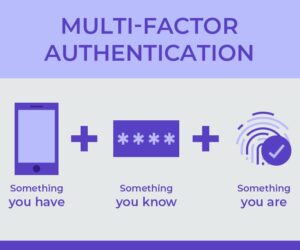
Introduction:
 In today’s digital age, where technology permeates every aspect of our lives, ensuring the security of our online identities and personal data is of paramount importance. The rise in cyber threats and sophisticated hacking techniques necessitates the implementation of robust security measures. Among the most effective defenses is multi-factor authentication (MFA), a method that significantly strengthens the security of online accounts and systems. This article explores the importance of MFA and why it has become an indispensable tool in the fight against cybercrime.
In today’s digital age, where technology permeates every aspect of our lives, ensuring the security of our online identities and personal data is of paramount importance. The rise in cyber threats and sophisticated hacking techniques necessitates the implementation of robust security measures. Among the most effective defenses is multi-factor authentication (MFA), a method that significantly strengthens the security of online accounts and systems. This article explores the importance of MFA and why it has become an indispensable tool in the fight against cybercrime.
What is Multi-Factor Authentication?
Multi-factor authentication is a security protocol that requires users to provide multiple forms of identification to verify their identity before gaining access to an account or system. It combines two or more authentication factors, typically categorized into three types: something the user knows (e.g., a password or PIN), something the user has (e.g., a smartphone or token), and something the user is (e.g., biometric data like fingerprints or facial recognition). By combining these factors, MFA adds an extra layer of protection, making it significantly more difficult for unauthorized individuals to access sensitive information.
Strengthening Security:
- Defense against Password-based Attacks: Passwords alone are no longer sufficient to protect accounts from unauthorized access. Cybercriminals employ various tactics, such as phishing, brute-forcing, and credential stuffing, to exploit weak or stolen passwords. MFA mitigates this risk by requiring an additional factor beyond a password, significantly reducing the chances of successful account breaches.
- Enhanced User Authentication: With MFA, users have greater control over their own security. By adding an extra layer of verification, MFA ensures that even if an attacker manages to acquire a user’s password, they would still require the additional authentication factor. This gives users peace of mind and helps prevent unauthorized access to their accounts.
- Mitigation of Data Breaches: Data breaches are a significant concern in today’s digital landscape. Companies and individuals can suffer severe consequences when sensitive data falls into the wrong hands. MFA acts as a powerful deterrent to cybercriminals by making it exponentially harder for them to gain unauthorized access, even if they manage to penetrate one layer of security.
- Safeguarding Remote Access: The COVID-19 pandemic has accelerated the trend of remote work, increasing the need for secure remote access. MFA plays a critical role in ensuring the integrity of remote connections, protecting corporate networks, and preventing unauthorized entry into systems that hold sensitive information.
Adoption Challenges and Best Practices:
While the benefits of MFA are undeniable, widespread adoption can face challenges due to usability concerns or resistance to change. However, organizations can encourage adoption by following these best practices:
- User-Friendly Interfaces: Implementing MFA should be intuitive and hassle-free for users. Organizations should strive to provide user-friendly interfaces, clear instructions, and easily accessible support to help users understand and adopt the additional security measures.
- Communication and Education: Organizations should educate their employees or users about the importance of MFA and its role in safeguarding their accounts. Clear and concise communication about the benefits and ease of use can alleviate concerns and encourage adoption.
- Adaptive and Risk-Based Authentication: Organizations can implement adaptive authentication systems that dynamically adjust the level of authentication required based on risk factors such as user behavior, location, or device used. This approach balances security with user convenience, minimizing disruption while still providing robust protection.
Conclusion:
Multi-factor authentication is a critical security measure that has become indispensable in today’s increasingly digitized world. By adding additional layers of verification beyond passwords, MFA significantly reduces the risk of unauthorized access and protects sensitive information from falling into the wrong hands. Organizations and individuals alike should embrace MFA as a powerful tool to fortify
This article was automatically generated with AI.





